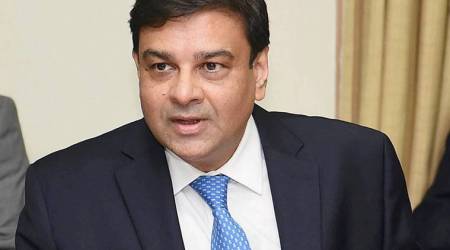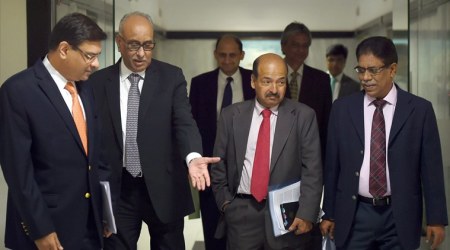 ‘More counting machines sought’, says Urjit Patel.
‘More counting machines sought’, says Urjit Patel.
RESERVE BANK of India (RBI) Governor Urjit Patel told a parliamentary panel on Wednesday that the demonetised Rs 500 and Rs 1,000 notes which were deposited in banks after November 8 are still being counted. Therefore, the RBI could not provide the “exact amount” of the scrapped notes received.
The RBI informed the Standing Committee on Finance, headed by senior Congress leader M Veerappa Moily, that it had issued tenders for fresh Currency Verification Processing System (CVPS) machines to speed up the counting.
Many panel members, especially those from the Opposition, are learnt to have expressed their dissatisfaction at his response.
“Will you be able to complete the counting by May 2019 (when the Narendra Modi government completes its five-year term),” asked Congress member Digvijaya Singh.
Another Opposition member, Naresh Agarwal of the Samajwadi Party, even walked out of the meeting, asking what was the point of calling the RBI Governor if the answers were not forthcoming.
This was Patel’s second appearance before the panel. After first appearing before the panel on January 18, he sought exemptions twice. He was accompanied by RBI Deputy Governors S S Mundra, N S Vishwanathan and B P Kanungo.
“We were told that there were 57 in-house CVPS machines, and seven additional machines have been brought in for counting. Now, they have issued tenders for new machines to expedite the process,” said a member, quoting Kanungo.
In a written submission, the RBI told the panel that “notes received during demoentisation are required to be reconciled with the reported figures to ensure accounting integrity, and processed for verifying numerical accuracy and authenticity through CVPS machines. This work has been accorded top priority. Since the CVPS machine capacity is limited, steps have been taken to expedite the process so as to arrive at the exact amount of Specified Bank Notes (SBNs) received.”
It said that all regional offices of the RBI have been operating the CVPS machines in two shifts, for six days of the week.
“We have also added machine capability by making use of large machines available with commercial banks for processing these notes, under our supervision. A tender has been floated to acquire additional machines from vendors on lease. Process for regular purchase of machines is being expedited,” said the RBI.
Holding up an old Rs 500 note, a ruling party member then asked RBI officials whether an expiry date should also be printed along with the year of issuance.
Panel members said the RBI officials did not answer most of their questions, including on the exact amount of demonetised currency that has returned to the central bank so far. The RBI officials are learnt to have offered to provide written replies to all the questions.
The panel, which is likely to submit its report during the Monsoon Session beginning next week, decided not to call Patel again.
During the meeting, members raised questions over the demonetisation drive, RBI’s preparedness for digital transaction, and prevalence of bitcoins. Digvijaya said none of the objectives of the demonetisation decision, including checking fake currency and controlling terror, had been achieved.
Criticising the government’s digital money pitch, an Opposition member referred to a photograph of Minister of State for Finance Arjun Ram Meghwal climbing a tree to make a phone call during a visit to his constituency sometime back. If a minister has to climb a tree to make a call due to poor connectivity, how will villagers in remote areas be able to carry out digital transactions, he asked.
It was earlier decided that three panel members would ask three questions each, after which the RBI Governor would give his replies. The other members would then resume questioning. But BJP member Nishikant Dubey, backed by his party members, blocked the move, saying Patel would only answer after all the questions were over.

